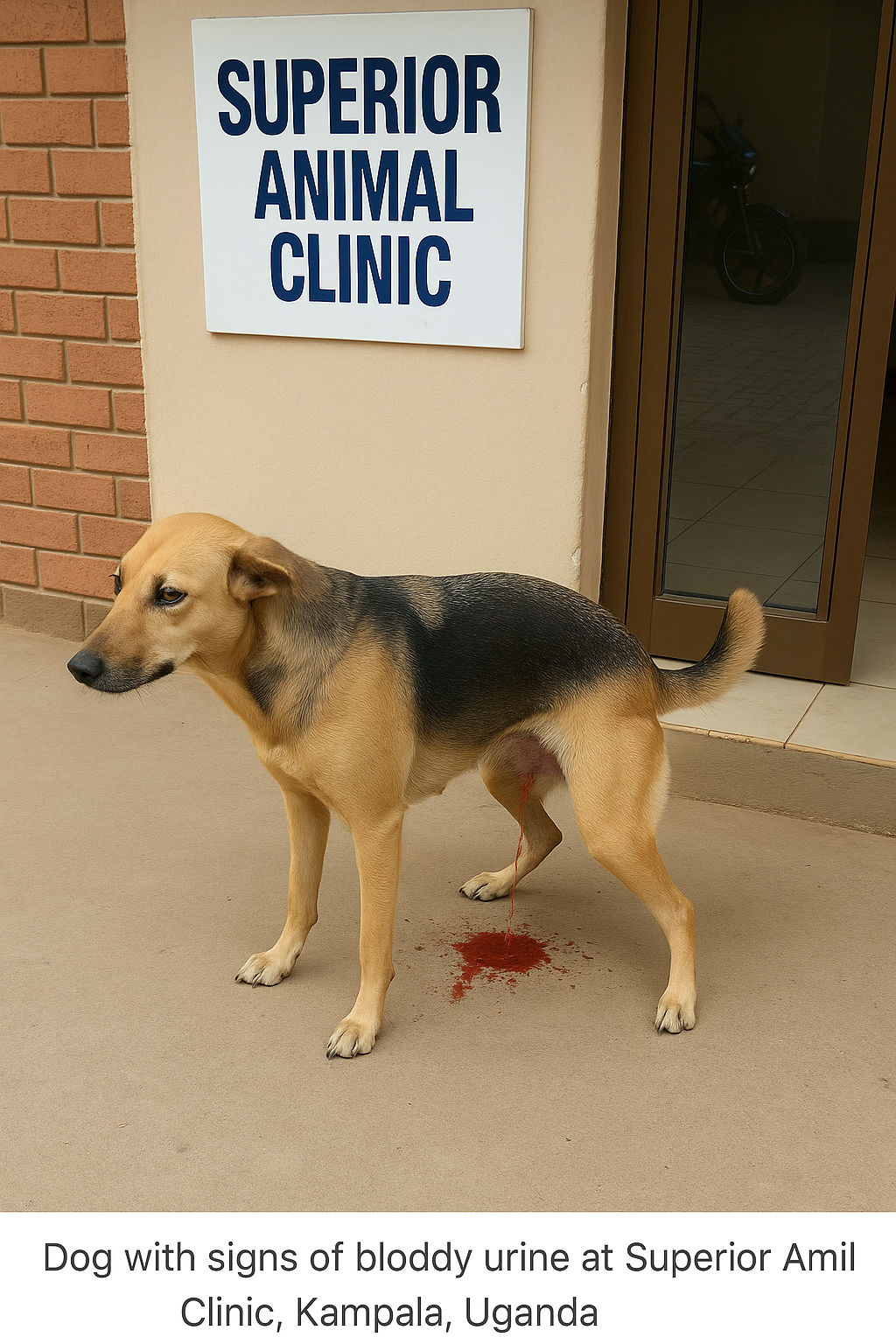
Has your dog suddenly started passing blood in its urine? As a pet parent, it can be one of the scariest things to see. Many dog owners in Kampala—from Ntinda, Old Kampala, Kasubi, Nsambya, Katwe, Zana, and Nakasero to Makindye, Buziga, Munyonyo, and beyond—search online asking: “Why is my dog urinating blood?”, “Is it an infection?”, or “Where can I find the best veterinary clinic near me to treat bloody urine in dogs?”
The truth is, bloody urine in dogs (hematuria) is not just a small problem—it’s a sign that something serious could be going on with your pet’s health. From urinary tract infections and bladder stones to dangerous tick-borne diseases like ehrlichiosis and babesiosis, this condition needs urgent veterinary care.
At Superior Animal Clinic in Makindye along Salaama Road, Kampala, we have years of experience diagnosing and successfully treating dogs with bloody urine. Pet owners across Kampala trust us because we not only treat the problem but also help you understand the cause, the treatment options, and the best ways to prevent it from happening again.
If your dog is peeing blood, don’t panic—you’re not alone, and the good news is that with the right care, most dogs recover fully. In this guide, we’ll walk you through everything you need to know: the causes, treatment methods, home care, prevention, and why Superior Animal Clinic is your best choice in Kampala for treating bloody urine in dogs.
Why Dogs Get Bloody Urine (Hematuria) in Uganda
If your dog is passing blood in urine, you may be wondering: “What exactly causes this in dogs around Kampala?” At Superior Animal Clinic, we’ve treated countless cases from areas like Ntinda, Old Kampala, Nsambya, Katwe, Zana, Makindye, Muyenga, Munyonyo, and even as far as Mityana. Bloody urine (hematuria) is not a disease by itself—it’s a warning sign that something more serious is going on in your dog’s body. Here are the most common reasons:
1. Urinary Tract Infections (UTIs)
- Dirty kennels, stagnant water, or poor hygiene often expose dogs in Kampala to bacterial infections.
- A UTI irritates the bladder lining, causing inflammation and bleeding.
- Female dogs are more prone due to their shorter urinary tract.
2. Tick-Borne Blood Parasites (Ehrlichiosis & Babesiosis)
- In Uganda, ticks are everywhere—especially in areas like Kasubi, Katwe, Nsambya, and Rubaga.
- These parasites attack red blood cells, leading to bloody urine, anemia, weakness, and even death if untreated.
- This is one of the leading causes of bloody urine in dogs in Kampala.
3. Bladder or Kidney Stones
- Dogs that don’t drink enough clean water or are fed poor-quality diets can develop mineral build-up.
- These stones scrape the bladder walls, causing blood in urine and pain while urinating.
4. Kidney Infections and Kidney Failure
- Common in older dogs or those exposed to contaminated water.
- Infections damage kidney tissue, leading to blood in urine, excessive thirst, and weight loss.
5. Prostate Problems in Male Dogs
- Older unneutered male dogs are prone to prostate enlargement or infections.
- This puts pressure on the urinary tract, often resulting in blood-stained urine.
6. Poisoning (Rat Poison, Household Toxins, or Herbs)
- In urban areas like Kololo, Nakasero, and Bugolobi, dogs sometimes ingest rat poison or toxic chemicals.
- These toxins prevent blood from clotting, leading to internal bleeding that shows up as blood in urine.
7. Injuries and Trauma
- Dogs hit by boda bodas, cars, or involved in fights often suffer internal injuries.
- Trauma to the bladder or kidneys can result in blood appearing in the urine.
8. Tumors and Cancer
- While less common, bladder or kidney cancer can cause bloody urine, especially in older dogs.
9. Bladder Inflammation (Cystitis)
- Even without infection, the bladder lining can become inflamed due to irritation, crystals, or stones.
- Dogs with cystitis often strain to urinate and may only pass a few drops mixed with blood.
10. Severe Dehydration
- Common in Kampala during hot seasons or when dogs don’t have access to clean water.
- Dehydration concentrates the urine, making the bladder and kidneys more prone to bleeding and infection.
11. Liver Diseases
- The liver helps with blood clotting. If it’s damaged by toxins, infections, or parasites, the blood may not clot properly.
- This can cause blood to appear in urine as well as other bleeding signs.
12. Inherited Blood Disorders
- Some dog breeds in Uganda (especially imported pure breeds like German Shepherds, Rottweilers, and Labradors) can have clotting disorders.
- These make them more likely to pass bloody urine even after minor infections or injuries.
13. Parasitic Worms
- Heavy infestations of certain worms (like kidney worms) can directly damage the urinary tract.
- Worm-related bloody urine is less common but still seen in rural areas like Mityana and Ndejje.
14. Complications After Giving Birth (in Female Dogs)
- Some female dogs may develop urinary infections or uterine complications after whelping.
- These can lead to bloody discharge mixing with urine, often confusing owners.
15. Side Effects of Certain Medications
- Drugs such as strong painkillers, blood thinners, or chemotherapy medications can sometimes irritate the urinary tract.
- If your dog started new medication and then developed bloody urine, this could be the cause.
16. Leptospirosis (Bacterial Infection from Dirty Water)
- Dogs in Kampala that drink from potholes, drainage channels, or stagnant water can catch leptospirosis.
- This infection damages both the kidneys and liver, leading to bloody urine, fever, and jaundice.
17. Spinal or Nerve Problems
- Dogs with nerve damage (often from accidents) may not empty their bladders properly.
- This urine retention can cause infections and eventually bloody urine.
👉 At Superior Animal Clinic, we carefully investigate each case because the cause of bloody urine can’t be guessed—it must be diagnosed. That’s why we use urine analysis, blood tests, ultrasound scans, and physical examinations to find the root cause before starting treatment.
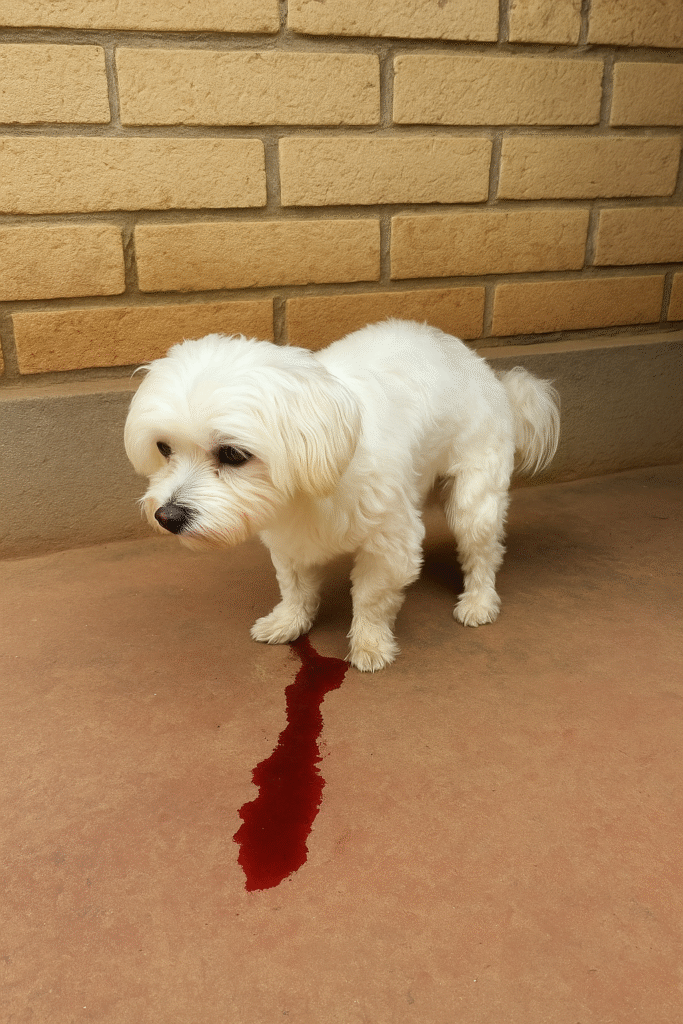
Dogs More Prone to Bloody Urine in Kampala
While any dog in Kampala can develop bloody urine, certain dogs are more prone due to age, breed, gender, health status, and lifestyle. Knowing which dogs are at higher risk helps you prevent serious complications and seek timely treatment at Superior Animal Clinic in Makindye.
1. By Breed
Some breeds are more susceptible to urinary tract issues, kidney problems, and bladder stones, which can lead to bloody urine:
- Labrador Retrievers – Prone to bladder stones and urinary tract infections.
- German Shepherds – Can develop kidney disease and are sensitive to bacterial infections.
- Rottweilers – More likely to suffer from kidney and prostate problems as they age.
- Bulldogs (English and French) – Can develop urinary tract blockages due to their shorter urethras.
- Dachshunds – Prone to bladder stones and urinary tract infections.
- Terriers (Jack Russell, Staffordshire) – Often develop bladder stones due to high activity and small bladder size.
These breeds often need regular veterinary check-ups to catch early signs of hematuria.
2. By Gender
- Male dogs are more prone to bloody urine caused by prostate issues, urethral blockages, and urinary tract infections.
- Female dogs can also develop bloody urine, usually due to urinary tract infections, but they are less prone to blockages than males.
3. By Age
- Puppies and young dogs – Often get urinary tract infections and trauma-related hematuria.
- Middle-aged to older dogs – More likely to suffer from bladder stones, kidney disease, or tumors, which can cause blood in urine.
4. Other Risk Factors
- Unvaccinated dogs – Higher risk of tick-borne diseases like ehrlichiosis and babesiosis.
- Dogs in high tick areas – Kampala neighborhoods like Makindye, Naguru, Katwe, Nsambya, and Rubaga often have stray dogs and ticks.
- Dogs fed poor-quality food or unbalanced diets – Can develop bladder stones and kidney problems.
- Inactive or overweight dogs – More prone to urinary tract issues and inflammation.
By identifying whether your dog falls into any of these risk categories, you can take preventive steps and get professional evaluation early at Superior Animal Clinic, the top veterinary clinic in Kampala for treating bloody urine.
How Superior Animal Clinic Treats Bloody Urine in Dogs in Kampala
At Superior Animal Clinic in Makindye, Kampala, we follow a step-by-step approach to accurately diagnose and effectively treat dogs presenting with bloody urine (hematuria). Our goal is not just to stop the bleeding but to treat the root cause and restore your dog’s health.
1. Comprehensive Examination and Diagnosis
- Physical Exam – Our veterinarians carefully check your dog for abdominal pain, dehydration, fever, or tick infestations.
- Laboratory Tests – We perform urine analysis, blood tests, and tick-borne disease screening to identify infections, kidney problems, or systemic diseases.
- Ultrasound & Imaging – If needed, we use ultrasound to detect bladder stones, tumors, or internal injuries.
2. Tailored Veterinary Treatment
- Urinary Tract Infections (UTIs): Treated with targeted antibiotics and pain relief.
- Bladder or Kidney Stones: May require dietary changes, medication, or surgical removal depending on severity.
- Tick-Borne Diseases (like Babesiosis or Ehrlichiosis): We administer anti-protozoal or anti-parasitic drugs, blood transfusions if needed, and supportive therapy.
- Trauma or Injuries: Managed with pain control, wound management, and hospitalization when necessary.
3. Supportive & Preventive Care
- Fluid Therapy to flush out toxins and prevent kidney damage.
- Special Diet Plans to promote urinary health and reduce recurrence of stones.
- Tick Prevention Programs to protect against repeat infections.
4. Follow-Up and Ongoing Monitoring
We schedule follow-up visits to track your dog’s recovery, adjust medications, and ensure no recurrence of bloody urine. Pet owners in Kampala neighborhoods such as Ntinda, Muyenga, Buziga, Munyonyo, Nsambya, Katwe, and Rubaga can always rely on Superior Animal Clinic for continuous, compassionate care.
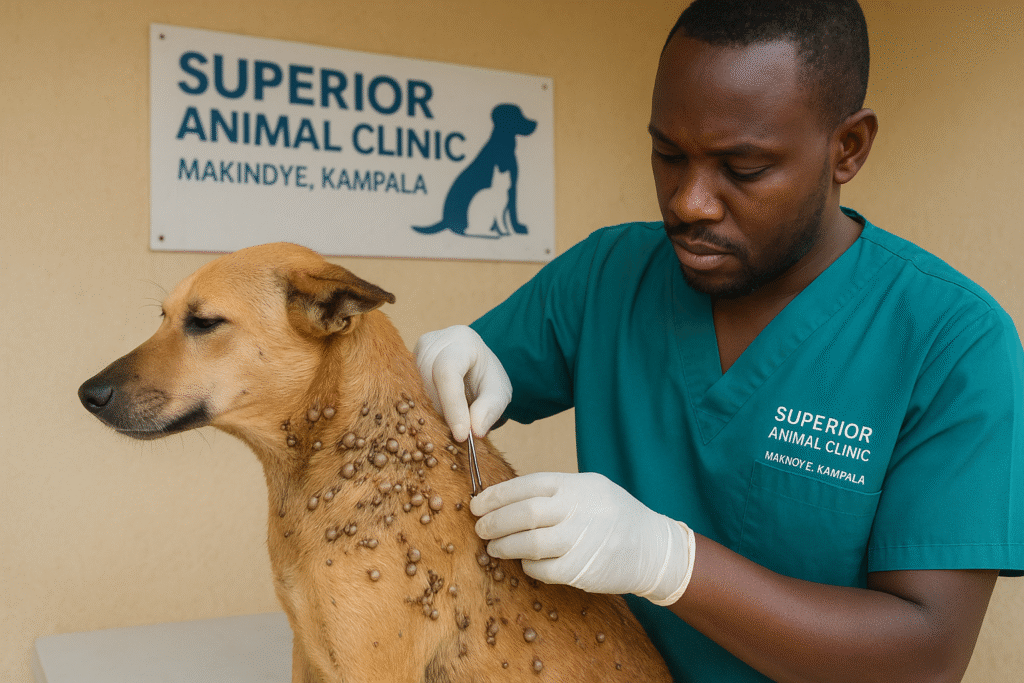
Best Foods for Dogs with Bloody Urine in Kampala, Uganda
When your dog is passing blood in urine, what you feed them can make a big difference in recovery. At Superior Animal Clinic, we guide dog owners on a diet that supports urinary health, reduces irritation, and strengthens the kidneys and immune system. Here’s a list of locally available foods and feeding tips that work best for dogs with bloody urine in Kampala:
1. Clean Fresh Water
- Always ensure your dog has access to fresh, clean water.
- Hydration helps flush out toxins, prevents urinary infections, and reduces blood irritation.
- Avoid giving water from ponds, swamps, or unclean sources, which can worsen infections.
2. Boiled Chicken or Fish
- Chicken and small fish (like tilapia or Nile perch) are excellent sources of protein.
- Boil them without salt or oil to make them gentle on the urinary tract.
- Remove bones, especially from fish, to prevent injuries to the digestive system.
3. Rice, Matoke, and Sweet Potatoes
- Boiled rice, matoke (steamed green bananas), or sweet potatoes are soft, easy to digest, and help soothe the bladder.
- Combine with protein like boiled chicken for a balanced meal.
4. Pumpkin and Carrots
- Pumpkin, carrot, and other soft vegetables are rich in fiber and antioxidants.
- They help support kidney function and aid digestion.
5. Eggs
- Boiled eggs are a locally available and affordable source of high-quality protein.
- Feed plain, without oil, salt, or spices.
6. Yogurt and Fermented Milk
- Plain, unsweetened yogurt or fermented milk can help maintain healthy gut bacteria.
- This supports overall immunity and aids recovery from infections.
7. Prescription or Specialized Diets
- For severe urinary issues, Superior Animal Clinic provides specialized diets that reduce bladder irritation and help dissolve stones.
- These diets are formulated to restore urinary pH balance and prevent recurrence.
Foods to Avoid
- Processed human food (fried snacks, salty foods, sausages).
- Dog foods with high sodium or artificial additives.
- Bones from fish or chicken, which can injure the urinary tract.
- Excess red meat, which can strain kidneys and worsen blood in urine.
Feeding Tips for Dogs with Bloody Urine
- Feed small, frequent meals instead of one large meal.
- Ensure plenty of water is available at all times.
- Keep the feeding area clean to prevent bacterial infections.
- Follow up with your vet at Superior Animal Clinic to adjust diet based on your dog’s recovery.
By carefully choosing locally available, nutritious, and easy-to-digest foods, you can help your dog recover faster from bloody urine and reduce the risk of recurrence.
Home Remedies & Supportive Foods for Dogs with Bloody Urine in Kampala
Alongside proper veterinary treatment, some safe home remedies and supportive foods can help your dog recover faster from bloody urine (hematuria). These remedies are locally available in Kampala, affordable, and gentle on your dog’s urinary system.
1. Plenty of Clean, Fresh Water
- Hydration is key for flushing out toxins and bacteria from the urinary tract.
- Always provide clean tap water, filtered water, or boiled and cooled water.
- Avoid water from ponds, roadside sources, or stagnant pools, which can introduce infections.
2. Herbal Remedies & Locally Available Plants
Certain safe herbs and plants used traditionally in Uganda can support urinary health:
- Dandelion Leaves (Amarula/Local Greens)
- Acts as a natural diuretic to help flush the urinary tract.
- Can be finely chopped and added in small amounts to food.
- Acts as a natural diuretic to help flush the urinary tract.
- Cranberries or Wild Berry Extracts (if available locally)
- Helps prevent bacteria from sticking to the bladder wall.
- Can be mashed and mixed with food or given as juice in small amounts.
- Helps prevent bacteria from sticking to the bladder wall.
- Pumpkin and Carrot
- Rich in fiber and antioxidants, they help soothe the bladder and support kidney function.
- Boil or steam and mix with protein like chicken or eggs.
- Rich in fiber and antioxidants, they help soothe the bladder and support kidney function.
- Ginger (small amounts)
- Natural anti-inflammatory.
- Grate a tiny bit into meals occasionally to reduce bladder irritation.
- Natural anti-inflammatory.
3. Supportive Foods
Locally available foods that complement veterinary treatment include:
- Boiled Chicken and Fish – Gentle on the bladder, high in protein.
- Rice, Matoke, Sweet Potatoes – Soothing, easy to digest, and prevents strain on kidneys.
- Eggs (boiled, plain) – High-quality protein to support recovery.
- Plain Yogurt or Fermented Milk – Supports gut health and immunity.
4. Feeding & Care Tips for Home Support
- Feed small, frequent meals to reduce strain on the urinary tract.
- Ensure your dog drinks water after each meal.
- Keep your dog clean and free from ticks to prevent infections.
- Monitor urine color daily; if blood persists, visit Superior Animal Clinic immediately.
5. What to Avoid at Home
- Salty or spicy foods
- Processed snacks and meat with preservatives
- Unclean or stagnant water
- Herbs or plants not confirmed safe for dogs
By combining proper veterinary care at Superior Animal Clinic with these locally available supportive foods and home remedies, dog owners in Kampala can help their pets recover faster, reduce pain, and prevent recurrence of bloody urine.
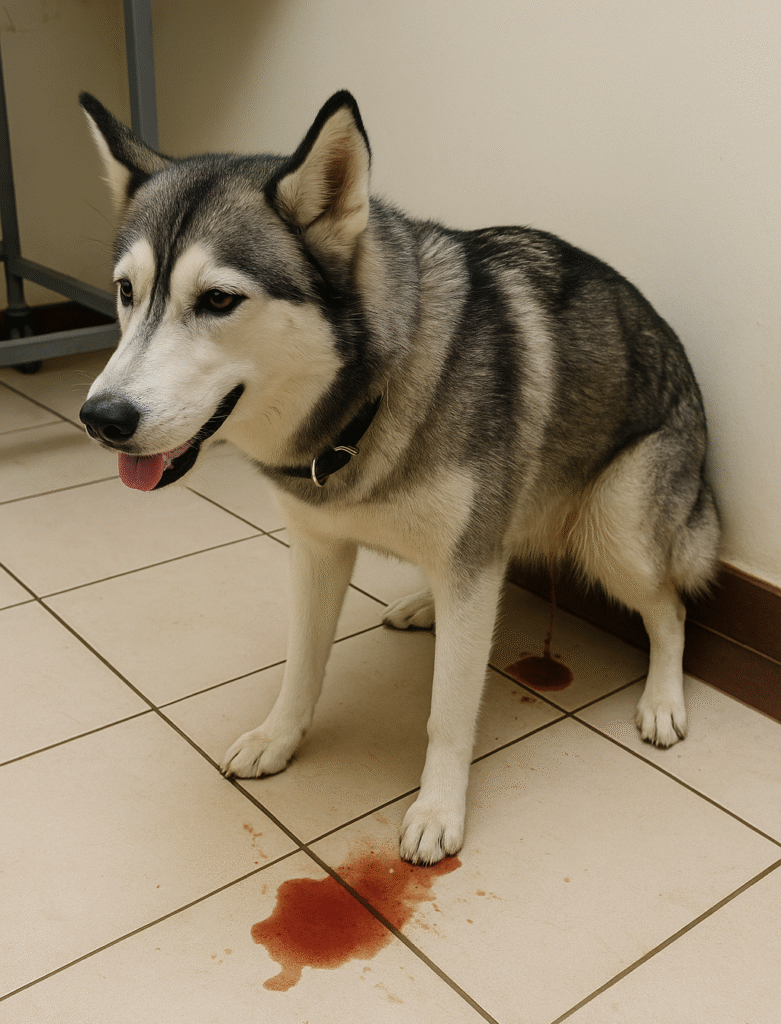
Prognosis: What Happens if Bloody Urine is Not Treated
If you don’t treat bloody urine in dogs, the condition can become life-threatening:
- Kidney failure
- Severe anemia
- Chronic pain and suffering
- Death from tick-borne diseases or poisoning
That’s why early veterinary treatment at Superior Animal Clinic is critical.
Areas in Kampala Where Bloody Urine in Dogs Is Common
If you live in Kampala and your dog is peeing blood, you’re not alone. Certain neighborhoods have higher cases of bloody urine in dogs due to factors like poor sanitation, tick infestations, stray dog populations, and access to clean water. At Superior Animal Clinic in Makindye, we see dogs from all over the city with hematuria, and here’s a breakdown of the areas where it’s most common:
- Ntinda & Naguru – These densely populated areas have many residential homes with small yards. Dogs here often get exposed to dirty water and stray dogs, increasing the risk of urinary infections and tick-borne diseases.
- Old Kampala & Kasubi – High traffic areas with limited green spaces make dogs more prone to bladder irritation and infections. Poor sanitation can also contribute to UTIs.
- Nsambya & Katwe – Dogs in these neighborhoods often live near busy streets and informal settlements. Exposure to contaminants, poor water quality, and stray animals increases the risk of bloody urine.
- Zana, Nakasero & Kololo – While relatively upscale, dogs here are sometimes prone to bladder stones and kidney issues due to diets high in table scraps and low hydration.
- Makindye & Muyenga – Dogs in Makindye and surrounding areas are frequently exposed to ticks and mosquitoes that carry blood parasites like Ehrlichia and Babesia, leading to hematuria.
- Buziga & Munyonyo – Proximity to Lake Victoria can expose dogs to contaminated water, parasites, and infections that affect the urinary tract.
- Nakawa & Lugogo – These commercial areas see dogs exposed to stress, poor hygiene, and occasional toxic ingestions that can result in bloody urine.
- Rubaga, Bugolobi, Kabowa & Kabojja – Stray dogs and inadequate veterinary care in these areas make bladder infections and kidney problems common.
- Lubowa, Seguku, Ndejje, Mutundwe, Bukoto, Bulindo & Kulambiro – Dogs in peri-urban areas are often left unsupervised, eating contaminated food, or missing routine vaccinations, which increases the risk of urinary tract infections and tick-borne hematuria.
✅ Why this matters: Knowing which areas have higher cases of bloody urine can help dog owners take preventive measures, like regular tick treatments, clean water, and early veterinary checks.
At Superior Animal Clinic, dog owners from all these neighborhoods trust us because we provide fast, effective, and affordable treatment for bloody urine, using the latest diagnostic tools and medications available in Kampala. Whether your dog lives in Ntinda or Bulindo, Makindye or Kololo, we are just a short drive away and ready to help.
How to Prevent Bloody Urine in Dogs in Kampala, Uganda
Preventing bloody urine in dogs is always better than treating it after it happens. At Superior Animal Clinic in Makindye, Kampala, we help dog owners to protect their pets from urinary problems. Here’s how you can prevent bloody urine in your dog:
1. Regular Tick Control and Parasite Prevention
Ticks and blood parasites are a major cause of bloody urine in dogs in Kampala. Dogs that roam outside in gardens, streets, and parks in areas like Nsambya, Katwe, and Naguru are particularly vulnerable.
- Use vet-recommended tick collars, sprays, or topical treatments.
- Check your dog daily for ticks and remove any found immediately.
- Treat your dog for intestinal parasites regularly, as these can indirectly affect kidney and urinary health.
2. Clean and Safe Drinking Water
Contaminated water can cause urinary infections leading to blood in urine.
- Provide fresh, clean water daily, especially in hot areas like Makindye, Muyenga, and Lugogo.
- Avoid stagnant water, puddles, or unfiltered water from local streams.
3. Maintain Good Hygiene
Poor hygiene encourages infections.
- Clean your dog’s bedding, kennel, and living areas at least once a week.
- Wash food and water bowls daily.
- Bathe your dog regularly, particularly after walks in muddy or tick-prone areas like Rubaga and Bugolobi.
4. Balanced Nutrition
A poor diet can make dogs more prone to bladder stones and urinary issues.
- Feed your dog high-quality, locally available dog food.
- Include fresh proteins like chicken or fish, and fiber-rich vegetables such as pumpkin or carrot.
- Avoid feeding excessive salts, fried foods, or leftover human meals.
5. Regular Veterinary Check-Ups
Many dog owners in Kampala only bring their pets when symptoms appear. Early detection can prevent serious problems.
- Schedule routine check-ups at Superior Animal Clinic every 3–6 months.
- Early urine and blood tests help detect infections, kidney problems, or bladder stones before they worsen.
6. Vaccinations and Preventive Medications
Some urinary problems are secondary to tick-borne diseases or infections.
- Vaccinate your dog against common infections and diseases prevalent in Uganda.
- Administer preventive medications as advised by our veterinarians at Superior Animal Clinic.
7. Avoid Trauma and Unsafe Environments
Dogs that roam streets in Katwe, Zana, or Nsambya are more prone to injuries that can cause blood in urine.
- Keep your dog in safe, fenced areas.
- Supervise outdoor play and walks, especially in busy streets.
By following these prevention steps, you significantly reduce the risk of bloody urine in your dog. Superior Animal Clinic in Makindye, Kampala is always ready to guide dog owners across all neighborhoods on preventive care, early detection, and expert treatment to keep your pet healthy and happy.
FAQs About Bloody Urine in Dogs in Kampala
1. Why is my dog peeing blood in Kampala?
Bloody urine, or hematuria, in dogs is often caused by urinary tract infections, bladder stones, tick-borne diseases, kidney problems, prostate issues, or trauma. At Superior Animal Clinic in Makindye, Kampala, we diagnose the exact cause using urine tests, blood tests, and ultrasounds to provide the best treatment.
2. How much does it cost to treat bloody urine in dogs in Kampala?
Treatment costs depend on the cause of bloody urine. For example, urinary tract infections are treated with antibiotics, while bladder stones may require surgery. At Superior Animal Clinic, we provide clear, affordable treatment plans for dogs ranging from UGX 50,000 to 350,00
3. Can bloody urine in dogs go away on its own?
No. Bloody urine is always a sign of an underlying health problem. Untreated cases can lead to kidney failure, severe anemia, or even death. Early veterinary care at Superior Animal Clinic, Makindye ensures a faster recovery and prevents complications.
4. What home remedies can I try for my dog with bloody urine in Kampala?
Home remedies can support recovery but cannot replace professional care. Safe steps include:
- Giving plenty of fresh, clean water daily.
- Keeping the dog’s kennel and bedding clean.
- Using cranberry supplements (supportive only).
Important: Always visit Superior Animal Clinic for proper diagnosis and treatment.
5. Which vet is best for bloody urine treatment in Kampala?
Dog owners across Makindye, Ntinda, Old Kampala, Nsambya, Katwe, Rubaga, and other neighborhoods trust Superior Animal Clinic for bloody urine in dogs. We provide accurate diagnosis, effective treatment, and ongoing care to ensure your dog fully recovers.
6. Can bloody urine kill a dog?
Yes. If untreated, bloody urine can lead to kidney failure, severe blood loss, or death, especially in dogs with tick-borne diseases or infections. Immediate veterinary care at Superior Animal Clinic in Makindye, Kampala is critical.
7. What are the most common causes of bloody urine in dogs in Uganda?
- Urinary tract infections (UTIs) – Most common in urban areas with poor hygiene.
- Bladder stones – Often caused by poor diet or dehydration.
- Tick-borne diseases – Highly prevalent in Kampala’s parks, gardens, and streets.
- Kidney and prostate problems – More common in older dogs.
- Trauma or poisoning – Dogs exposed to toxins or unsafe environments.
8. How can I prevent bloody urine in my dog in Kampala?
- Regular tick control and parasite prevention.
- Clean water and hygiene for the dog’s environment.
- Balanced diet and nutrition.
- Routine veterinary check-ups at Superior Animal Clinic.
- Vaccinations against common tick-borne diseases.
9. What foods are safe for a dog with bloody urine in Kampala?
- Fresh, clean water for hydration.
- High-quality proteins: chicken, fish, eggs.
- Digestive-friendly vegetables: pumpkin, carrot.
- Prescription urinary care diets recommended by Superior Animal Clinic.
- Avoid salty, processed, or fatty foods that stress the kidneys.
10. How quickly will my dog recover from bloody urine?
Recovery time depends on the cause. Dogs with UTIs may improve in a few days, while bladder stones or kidney disease may take weeks and require ongoing care. Early intervention at Superior Animal Clinic, Makindye, Kampala ensures the best outcomes.
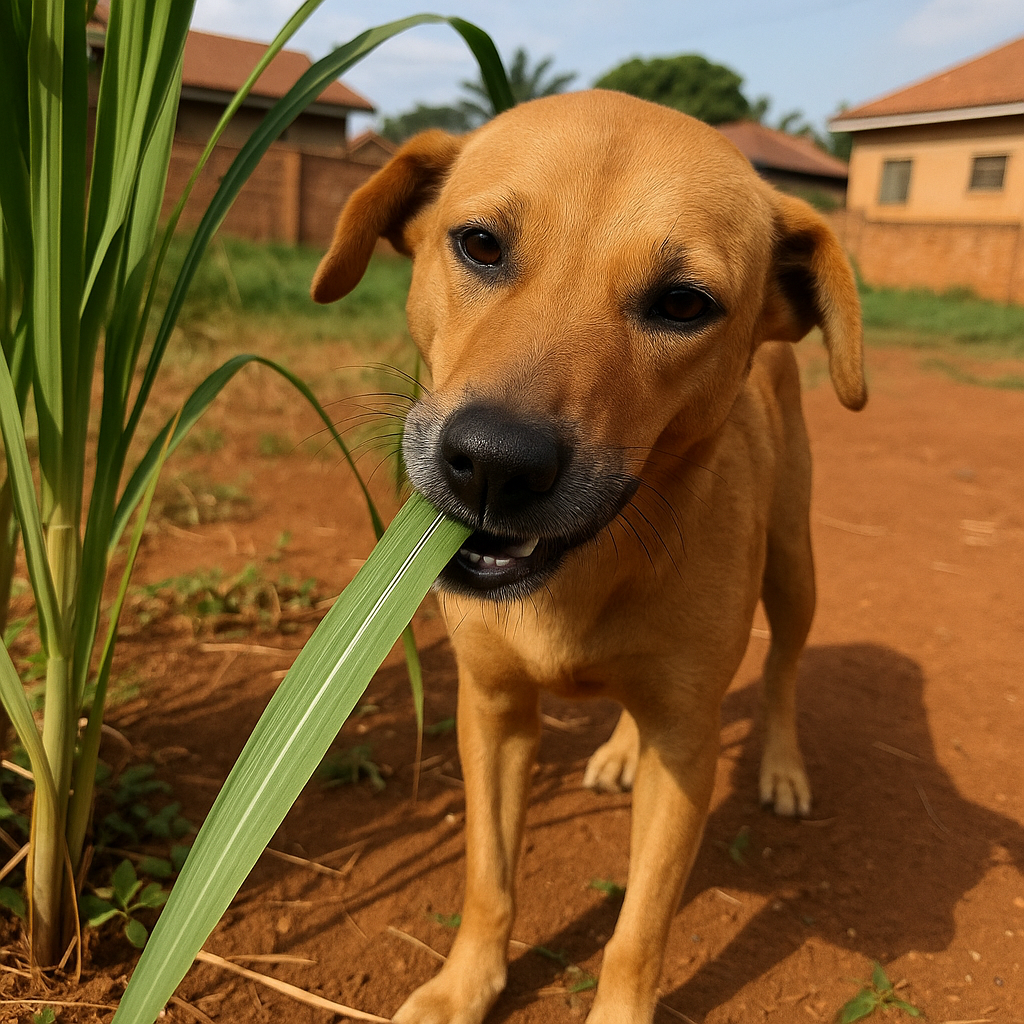
11. Are dogs in specific Kampala neighborhoods more at risk?
Yes. Dogs in Ntinda, Old Kampala, Kasubi, Nsambya, Katwe, Zana, Nakasero, Makindye, Muyenga, Rubaga, Bugolobi, and Lugogo are more prone due to high tick prevalence, poor drainage, and stray dog populations.
12. My dog’s urine is pink or red. Does that mean it’s bloody urine?
Not always. Sometimes pinkish urine can be from diet, medications, or minor irritation, but it can also indicate hematuria. Bring your dog to Superior Animal Clinic in Makindye for proper testing to be safe.
13. Can puppies get bloody urine?
Yes. Puppies are vulnerable to urinary infections, congenital kidney problems, and parasites. Early veterinary care at Superior Animal Clinic, Kampala is essential for preventing complications.
14. How do I know if my dog’s bloody urine is from an infection or something serious like cancer?
Only diagnostic tests at a veterinary clinic can confirm the cause. At Superior Animal Clinic, we use urine analysis, blood tests, ultrasound, and X-rays to determine whether it’s a simple infection or a more serious condition.
15. Are male dogs more likely to have bloody urine than females?
Yes, male dogs are more prone to prostate-related issues and urinary blockages, which can cause hematuria. Female dogs are more prone to urinary tract infections. Both sexes benefit from early treatment at Superior Animal Clinic, Makindye.
16. How long should I wait before taking my dog to a vet for bloody urine?
Do not wait. Bloody urine can escalate quickly into kidney failure, anemia, or life-threatening infections. Visit Superior Animal Clinic immediately for prompt care.
17. Can stress or excitement cause blood in my dog’s urine?
Stress rarely causes blood in urine. Most cases are due to infections, stones, parasites, or trauma. However, stress can worsen underlying conditions, so monitor your dog and seek veterinary care.
18. Can dogs in Kampala get recurring bloody urine?
Yes, especially if underlying causes like stones, parasites, or poor diet are not managed. At Superior Animal Clinic, we provide long-term prevention plans, including diet guidance, medications, and follow-up check-ups to reduce recurrence.
19. Are there safe medications I can give my dog at home before visiting the vet?
No. Giving over-the-counter medications without a vet’s prescription can worsen the condition. Only a veterinarian at Superior Animal Clinic, Makindye, Kampala can prescribe safe antibiotics, anti-parasitics, or supportive care.
20. Can I take my dog home after treatment or is hospitalization required?
It depends on severity. Dogs with simple infections can often be treated as outpatients, but those with bladder stones, severe infections, kidney problems, or anemia may need short-term hospitalization at Superior Animal Clinic for monitoring and IV therapy.
21. Is bloody urine painful for my dog? How can I tell?
Yes, many dogs feel discomfort or pain while urinating. Signs include straining, whining, frequent urination, licking the genital area, or hiding. Early veterinary care at Superior Animal Clinic helps relieve pain quickly.
22. How can I support my dog at home after bloody urine treatment?
- Give plenty of clean water to flush the urinary system.
- Feed high-quality proteins and kidney-friendly foods.
- Keep the dog’s environment clean and stress-free.
- Complete all medications prescribed by Superior Animal Clinic.
23. Are there neighborhoods in Kampala where bloody urine is more common?
Yes. Dogs in Ntinda, Old Kampala, Kasubi, Nsambya, Katwe, Zana, Nakasero, Makindye, Buziga, Munyonyo, Nakawa, Rubaga, Muyenga, Naguru, Bugolobi, Kabowa, Kabojja, Lugogo, Lubowa, Seguku, Ndejje, Kololo, Mutundwe, Bukoto, Bulindo, and Kulambiro are at higher risk due to tick infestations, poor drainage, stray dogs, and contaminated water sources.
24. Can untreated bloody urine affect my dog’s lifespan?
Yes. If left untreated, causes like kidney failure, severe anemia, cancer, or chronic infections can shorten your dog’s life. Early treatment at Superior Animal Clinic in Makindye ensures a better prognosis and longer, healthier life.
Why Choose Superior Animal Clinic for Bloody Urine Treatment
- Experienced veterinary doctors.
- Modern diagnostic tools (lab tests, ultrasound).
- Affordable, compassionate care.
- Convenient location in Makindye, Salaama Road, Kampala.
- Trusted by dog owners across Kampala and nearby towns like Mityana.
👉 If your dog is passing blood in urine, don’t wait—visit Superior Animal Clinic today.
Conclusion
Bloody urine in dogs is a serious condition that requires prompt attention. Whether it’s caused by infections, bladder stones, or tick-borne diseases, early treatment can save your dog’s life. At Superior Animal Clinic in Makindye, Kampala, we provide expert diagnosis, effective treatment, and compassionate care for dogs from Ntinda, Old Kampala, Kasubi, Nsambya, Katwe, Makindye, Rubaga, Muyenga, and all surrounding neighborhoods. Don’t wait—bring your dog to Superior Animal Clinic today and ensure they get the best care possible.

What’s the deal with bbjljl? Is it just another clone site, or does it have anything special going on? Let a brother know.